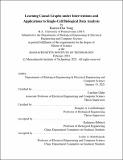| dc.contributor.advisor | Caroline Uhler and Douglas A. Lauffenburger. | en_US |
| dc.contributor.author | Yang, Karren Dai. | en_US |
| dc.contributor.other | Massachusetts Institute of Technology. Department of Biological Engineering. | en_US |
| dc.contributor.other | Massachusetts Institute of Technology. Department of Electrical Engineering and Computer Science. | en_US |
| dc.date.accessioned | 2021-05-25T18:20:30Z | |
| dc.date.available | 2021-05-25T18:20:30Z | |
| dc.date.copyright | 2021 | en_US |
| dc.date.issued | 2021 | en_US |
| dc.identifier.uri | https://hdl.handle.net/1721.1/130806 | |
| dc.description | Thesis: S.M., Massachusetts Institute of Technology, Department of Biological Engineering, February, 2021 | en_US |
| dc.description | Thesis: S.M., Massachusetts Institute of Technology, Department of Electrical Engineering and Computer Science, February, 2021 | en_US |
| dc.description | Cataloged from the official PDF version of thesis. | en_US |
| dc.description | Includes bibliographical references (pages 49-51). | en_US |
| dc.description.abstract | This thesis studies the problem of learning causal directed acyclic graphs (DAGs) in the setting where both observational and interventional data is available. This setting is common in biology, where gene regulatory networks can be intervened on using chemical reagents or gene deletions. The identifiability of causal DAGs under perfect interventions, which eliminate dependencies between targeted variables and their direct causes, has previously been studied. This thesis first extends these identifiability results to general interventions, which may modify the dependencies between targeted variables and their causes without eliminating them, by defining and characterizing the interventional Markov equivalence class that can be identified from general interventions. Subsequently, this thesis proposes the first provably consistent algorithm for learning DAGs in this setting. Finally, this algorithm as well as related work is applied to analyze biological datasets. | en_US |
| dc.description.statementofresponsibility | by Karren Dai Yang. | en_US |
| dc.format.extent | 51 pages | en_US |
| dc.language.iso | eng | en_US |
| dc.publisher | Massachusetts Institute of Technology | en_US |
| dc.rights | MIT theses may be protected by copyright. Please reuse MIT thesis content according to the MIT Libraries Permissions Policy, which is available through the URL provided. | en_US |
| dc.rights.uri | http://dspace.mit.edu/handle/1721.1/7582 | en_US |
| dc.subject | Biological Engineering. | en_US |
| dc.subject | Electrical Engineering and Computer Science. | en_US |
| dc.title | Learning causal graphs under interventions and applications to single-cell biological data analysis | en_US |
| dc.type | Thesis | en_US |
| dc.description.degree | S.M. | en_US |
| dc.description.degree | S.M. | en_US |
| dc.contributor.department | Massachusetts Institute of Technology. Department of Biological Engineering | en_US |
| dc.contributor.department | Massachusetts Institute of Technology. Department of Electrical Engineering and Computer Science | en_US |
| dc.identifier.oclc | 1252627361 | en_US |
| dc.description.collection | S.M. Massachusetts Institute of Technology, Department of Biological Engineering | en_US |
| dc.description.collection | S.M. Massachusetts Institute of Technology, Department of Electrical Engineering and Computer Science | en_US |
| dspace.imported | 2021-05-25T18:20:30Z | en_US |
| mit.thesis.degree | Master | en_US |
| mit.thesis.department | BioEng | en_US |
| mit.thesis.department | EECS | en_US |
